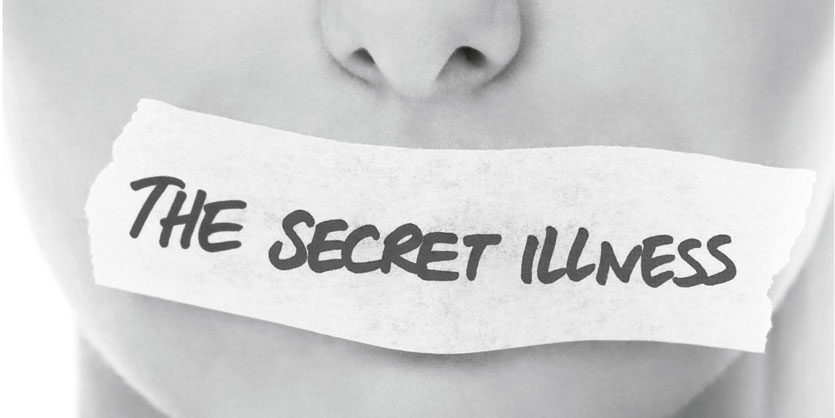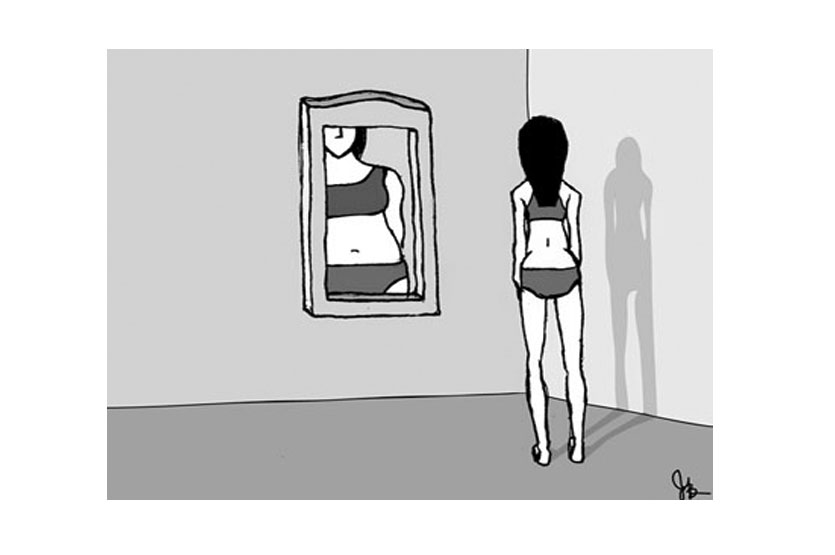Apr 25 2017.
views 2981"Oh! You have put on some weight!" is a rather brutally honest remark, which we often hear from our relatives or loved ones. But the impact this could have on the lives of teenagers, is beyond imagination. After reaching puberty, teenagers, including boys have a tendency to give more attention to their looks. Although we believe that only girls are figure-conscious, even boys take it as serious business. Over the years we have come across many people with unhealthy eating habits, some that have led to rapid weight loss due to eating disorders.
According to the American Psychological Association (APA), eating disorders are described as abnormal eating habits that can threaten your health or your life. In today's era of information and technology, people are convinced to take up 'new' challenges. There may be people among us who maybe experiencing an eating disorder but you may never know, sometime till it is too late.

Speaking to Life Online, Senior Dietician, Nutritionist, Lifestyle and Wellness Expert Sigrid De Silva highlighted how difficult it is to treat eating disorders, the influence of media and what could be done if someone encounters a person with an eating disorder.
How difficult is it to treat eating disorders?
Eating disorders require team work to put it right. It is something quite serious and team work means that it firstly requires parents to know that an eating disorder is happening. Then a physician needs to check if there had been a health issue developed as a result of this eating disorder. It depends on the duration because it could go unnoticed since most parents are working today. Then we need a psychologist in the team as well as a dietician or nutritionist. Therefore you could see that there needs to be many professionals involved when somebody develops an eating disorder. One important fact that needs to be noted is that eating disorders are quite difficult to be treated. Personally I think it is the most difficult disorder to treat out of all the disorders we encounter in our profession.
How can one find out if someone has developed an eating disorder?
Sometimes we do not know the reason why the individual has developed an eating disorder. It is not an extreme type of dieting nor is it a fad diet. It may have started with some type of extreme diet or may have started with somebody saying 'Oh! You have put on weight.' This is a common reason for teens to start dieting. It may have been a comment from a friend, relative or parent. It may even start with a normal diet or it may even develop through a diet recommended by a dietician. The person then goes further than he was advised because after he or she sees the success in losing weight or seeing how much of control could be done with food, these teenagers could see the results. Sometimes warning signs could be identified when patients are too perfect or they start losing weight fast. The worst part is that the patient will not know that they are having an eating disorder. But with the online facilities available people would be aware of it.

Image courtesy: www.communitytimes.me/silent-killers-eating-disorders
How does media influence the tendency to develop eating disorders?
Eating disorders are becoming unfortunately more common because there is more information available for people nowadays. There are TV programmes which highlight only about the body image and they are a bad influence for the viewers. They don't speak about health or education but it is only about the body image, how to dress, what make up to put on etc. Eating disorders have become more and more difficult to detect even for parents. Families are not like families anymore, each member goes to their own room or use their smart devices. Very often a distant relative would notice that there's something wrong and the relative will speak to the parent or neighbour. Sometimes parents get offended but they need to look carefully and see if their child is developing an eating disorder. These websites have not been banned and even in chat rooms this issue is not highlighted as a disorder. They even go to extremes such as setting targets, for example; your next target is this many kilos etc. If someone dies it's not their responsibility. So those interested in losing weight receives global support and they give ideas about disguising and other ways of covering it up.
What are the symptoms of eating disorders?
Since there is no family togetherness anymore, teens could easily say that they would eat later in school. Today it's quite easy to disguise but parents could identify rapid weight loss as one visible symptom. Therefore if there's rapid weight loss then the first thing that should come in to mind is an eating disorder. Then one has to think back as to how long it has been happening. One disturbing fact is that there are websites which support people to develop eating disorders. As such there are chat rooms for people to get together with others who have the same interest in losing weight in an abnormal way. Therefore the signs come in very late. If an eating disorder has manifested for six months it is relatively easier to treat than if it has been there for a year or longer. Then it gets more difficult. More and more boys too have this issue of eating disorders quite contrary to what we saw back in the day. Therefore parents shouldn't let go of boys as well. Excessive exercise with odd eating habits also falls under eating disorders.

Image courtesy: www.shop.ucsc.edu/general-health-wellness/eating-disorders-diet.html
Could they be genetically predisposed at any point?
I don't think it is genetic. It starts with dieting and eventually develops in to an eating disorder. It depends on how the family works together and how much of support there is from the family. I think the least loved in the family has a bigger tendency to develop abnormal eating habits and eventually end up with an eating disorder.
Given that a person has gone to the extreme of an eating disorder, how could he or she be treated back to normal?
Sometimes it takes a year and depending on the duration it could even be three months. But if it takes three months it's quite rare and in that case the patient is quite lucky. Sometimes it takes years and there's no end to it.
What is the immediate thing a loved one should do if they find someone with an eating disorder?
They will know that something is wrong but the child or the patient will be in denial. So the patient will have to be dragged to see a professional. Since the patient is in denial it will be difficult to convince him or her. This is why specialists are important and it is important that the patient understands that death would be a consequence, or for the rest of their life, their health can be impaired. In most instances these individuals do not get shocked when they hear the consequences. If it's only bulimia, it could be treated but in most instances it is a combination of many disorders.
In Sri Lanka, how likely is it that people could develop eating disorders? Does their social stratum matter?
I have never come across a farmer's daughter developing an eating disorder. But in the urban settings it could be from any strata. This has nothing to do with the finances and it is mostly involved with access to information and the relationship within the family unit. This is a habit among students in international schools but it is mushrooming in to other schools as well. Therefore if teachers could observe the changes happening in children, they too could contribute to the betterment of their lives. The signs of bulimia is quite hard to get rid of but one has to be observant. Not everybody loses a lot of weight but it is quite difficult to find.
Your message to those who want to lose weight?
If you feel you need to lose weight get professional help from the beginning. Then you cannot fall in to that category and it will be recognized easily. If you try to do these things on your own it starts with an extreme diet or fad diet.

Males too could develop eating disorders: Dr. Ramani Ratnaweera
In her comments on this issue, Dr. Ramani Ratnaweera, Consultant Psychiatrist at the Karapitiya Teaching Hospital said that people are quite concerned about their weight in today's society. "With the growth of hormones and peer pressure, people get many comments about their image. Thereafter they tend to develop abnormal eating habits and this is not only restricted to females. Even males have a tendency to develop eating disorders. The Body Mass Index (BMI) of any individual should be 25 or more but if it's less than 13 it is a medical emergency situation. Those having eating disorders also have various psychological problems such as low self-esteem, depression, anxiety and loneliness. Other factors such as issues in the home front and difficulty in expressing feelings too could probe someone to develop an eating disorder. When we see someone having abnormal eating habits we tend to think that she's trying to grab the attention of those around her but it wouldn't always be the case."
Types of Eating Disorders
According to the APA's Diagnostic Statistical Manual of Mental Disorders -V (DSM -V) the types of eating disorders are as follows:
Anorexia Nervosa
· Inadequate food intake leading to a weight that is clearly too low.
· Intense fear of weight gain, obsession with weight and persistent behaviour to prevent weight gain.
· Self-esteem overly related to body image.
· Inability to appreciate the severity of the situation.
Binge Eating Disorder
· Frequent episodes of consuming very large amounts of food but without behaviours to prevent weight gain, such as self-induced vomiting.
· A feeling of being out of control during the binge eating episodes.
· Feelings of strong shame or guilt regarding the binge eating.
· Indications that the binge eating is out of control, such as eating when not hungry, eating to the point of discomfort, or eating alone because of shame about the behaviour.
Bulimia Nervosa
· Frequent episodes of consuming very large amount of food followed by behaviours to prevent weight gain, such as self-induced vomiting.
· A feeling of being out of control during the binge-eating episodes.
· Self-esteem overly related to body image.
Night Eating Syndrome
Characterized by a delayed circadian pattern in the food intake. It differs from binge eating in that the amount of food consumed in the evening/night is not necessarily objectively large nor is a loss of control over food intake required.
· Those with night-eating syndrome eat a majority of their food during the evening.
· Traits of patients with night-eating syndrome may include being overweight, frequent failed attempts at dieting, depression or anxiety, substance abuse, concern about weight and shape, perfectionism and a negative self-image.
0 Comments